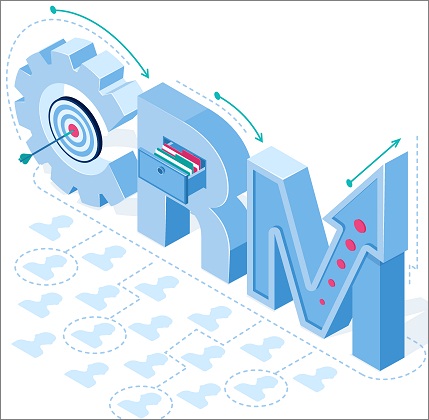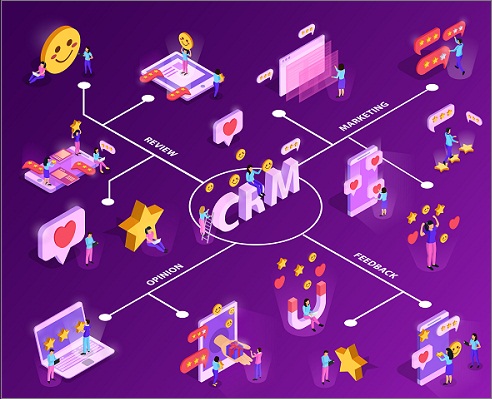CRM Full Form - Customer Relationship Management
Last Updated by Devender
0 3330
What is the full form of CRM?
The full form of CRM is Customer Relationship Management.
Customers are the real driving force behind any business and CRM is a system that can help understand the needs and requirements of the customers to create a more grounded business association with them.

CRM or Customer Relationship Management is a term that has been used since early 1900 when the idea of the business began to change from being value-based to social. CRM straightforwardly contributes to client benefits and the development of organizations.
It is designed to help in compiling the company's information to contact customers including the company's website, email, phone number, products, etc. while providing detailed information of the customer like personal details, purchasing history, advice, etc.
CRM History
Take a look at a brief history of CRM:
- 1970s - The concept of CRM started
- 1982 - The concept of database marketing was introduced
- 1986 - A customer Evaluation system named "ACT" was released by Pat Sullivan and Mike Muhney
- 1993 - First CRM product, Siebel Customer Relationship Management was designed
- 1997 - CRM got the popularity in the world
- 1999 - First mobile CRM app was introduced
- 2004 - Open-source CRM system was developed
- Analytics
- Business Reporting
- Client Assistance
- Human Resource Management
- Lead Management
- Marketing
- Sales Force Automation
- Workflow Automation
- Better Customer Experience
- Grow the Customer Base
- More Focused Marketing
- Improve Workforce Productivity
- Upgrade Business Sales
- Integrates Everything in One Place
- Scalability
- Help you to collect user data
- Access data from anywhere
- Faster Conversion Rates
- Better Customer Service
- Save loads of money on long term
- Simplified Marketing and Targeting
- Sometimes the data gets lost
- Requires technical support
- Requires a huge investment at the beginning
- Security issues
Since then, CRM systems have helped millions of businesses throughout the world.
CRM Elements
Some of the CRM essential elements are:
Analytics is the way of understanding, taking care of, and representing data in various graphical formats such as diagrams, tables, patterns, etc. to monitor the market patterns.
Business Reporting is used to generate reports of sales, customer service, and marketing.
Client Assistance is used for gathering and sharing the client-related data to the concerned department such as personal data (name, address, age), transition history, reviews and suggestions.

Human Resource Management includes utilizing and putting the most qualified human asset at a necessary spot in the business.
Lead Management includes monitoring the potential customers and circulation, dealing with the campaigns, planning customized structures, finishing the mailing records, and considering the buying patterns of the clients.
Marketing includes framing and executing marketing strategies by examining existing and potential clients to sell the item.
Sales Force Automation incorporates forecasting, recording deals, handling, and monitoring potential connections.
Workflow Automation includes smoothing out and planning different procedures that run in equal. It decreases expenses and time whereas prevents appointing a similar assignment to various workers.
Features of CRM
Here are some of the essential features of CRM:
1 Customer service
2 Customer satisfaction
3 Customer needs
4 Customer Retention
5 Customer Complaints
6 Customers Response
Benefits of using CRM
There are various benefits of using CRM and that is why every business around the world is using it. Here are some of the top benefits of using CRM:
CRMs allow businesses to simplify the whole process for the customers from the beginning to the end according to the needs of the customer. Thus, improving the customers' experience and in return their relationship with the business.
CRM deals with the current clients as well as makes information for prospective clients who are yet to change over. It helps to create and deal with a gigantic client base that encourages benefits coherence, in any event, even for a small business.
CRM provides all the data related to the sale pipeline of any business and potential customers which can help in more focused marketing than conventional mass marketing.
A CRM framework can make sorted out habits of working for deals and deals with the board staff of a business. The business staff can see the client's contact data, follow up through email or online networking, oversee errands, and track the salesman's presentation. The salespersons can address the client requests quickly and resolve their issues.
CRM techniques can be utilized to close more arrangements, increment deals, improve estimate exactness, and proposal selling. CRM assists with making new deals openings and in this way help in expanding business income.
CRM Advantages
Some of the advantages of CRM systems are as follows:
CRM Disadvantages
Some of the disadvantages of CRM systems are as follows:

Share:








Comments
Waiting for your comments